Samanvaya periodically publishes either to supplement or as an outcome of our various social engagements and / or concerns. Over the years, we have brought out the following publications, reports and reflective notes. Some of these we have published ourselves, others have been published elsewhere. We have provided the links to the respective publications and publishers wherever we can.
Samanvaya Year End Report 2024
Our annual year end report for the year 2024, updates on our work for the year and reflection. You can down load the copy from here.
Future Nutrition - Understanding our Toxic Transitions, April 2024
Indian food systems are undergoing one of the most toxic transitions currently. Within the next 10 years, India may go through the worst ever Nutritional crisis that will impact more people than the great famine and the one on which we will have less control over, than ever. This compilation brings together the food systems transitions that could prove to be biggest nutritional challenge unless consumers and governments take note in the coming years or even months. It urges consumers, civil society, policy makers and academics to take urgent note of these toxic transitions and demand better nutritional food.
This periodic report from Samanvaya compiles the overall toxic nature of food system transition on the four arms of the consumer behaviour of food - lifestyle, market reorganization, ultra-processed food growth, and reduction in the nutrition supply by the staple food of majority of Indians. With these transitions alongside the predicted reduction of food production due to climate change (>15%), by the end of the decade, India is in the verge of a nutritional collapse for its future citizens. This is the time to act on it and this time the onus is on the urban educated consumer to act.
Immediate demand on the labelling of ultra-processed food, reduction of the advertisement and visibility of the same, extra taxation, increasing awareness, more stringent regulation and re-working the priorities of the markets that are currently tilted heavily towards the profits of the retailers.
The report can be downloaded here.
If you are a concerned citizen who wants to take action on Future Nutrition, please sign up here
"We congratulate the efforts taken by Shri.Ramasubramaniam and Ms. Rama and the team members in preparing the report on Future Nutrition – understanding our Toxic Transition. ...We are circulating this mainly to our Homes where we are taking care of the children and these points may be discussed during the preparation and revision of the menu to the children and also in our Hospital."K.SHIVAKUMAR
Managing Trustee, Gandhigram Trust, Dindigul Dist. Tamil Nadu INDIA
"Vanakam, Thanks a lot for the thought provoking booklet- Future Nutrition. Even though the urban community is aware of dangers in using UPF …When I was discussing with my friends about it, they were like… we have become habitual to the easy available foods and skeptical about the local foods. My elder daughter has started to avoid the packed -UPF food. Thank you."
- Urban Consumer, Mother and Homemaker
The Samanvaya Year End Report, 2023
17 pages to capture all the efforts and initiatives of a very active year that was at Samanvaya 2023.






Urban Land Use Policy - A Reflective Note, Mar 2023
It was sometime in 2022 that I got a call to be in the Land Use Policy Sub-Committee of the Government of Tamil Nadu in the newly constituted State Planning Commission. Subsequently, I was informed that I was to be heading the Urban Land Use Policy framing for the SPC, a task that was assigned with neither any assistance (I requested), nor proper coordination or any form of financial assistance (I offered to hire my own assistance and requested the government if they can support such a person, it was denied). All this was not surprising, I had gotten a glimpse of the civil-society engagement with the government agencies in policy making earlier as well. Their inputs did not warrant the same attention as that of a business person with capacity to invest in the state. What was more surprising was when I put in effort to call for a meeting of all the relevant departments that were involved in urban land use and asked them to give specific data / inputs on some of the questions that I had posed for them, most of them did not take it seriously or bother even sending their top officials to attend to the meeting, I had to make do with whoever happened to be free on that day in their department. This was outright appalling, but, not worse than the subsequent rejection of my suggestion to do another round of meeting by the SPC staff themselves as they themself were understaffed and did not have any funds to organize such meetings.
Eventually, after several attempts to get further inputs from the departments, I ended up writing a note with suggestions that was submitted to the SPC and for which they did not even have the courtesy to acknowledge, nor since then have they bothered to send any further information on the same. - Ram, March 2023
BRITISH COUNTERING OF GANDHIJI'S VILLAGE INDUSTRIES MOVEMENT c. 1934-38
a chapter for the PPST special publication on the Centenary of Gandhian Thinker & Historian, Dharampal, 2022.
As part of the Centenary celebration of late Sri. Dharampal, Gandhian Historian with whom the founders of Samanvaya spent quite a lot of time during his last years, Patriotic People Oriented Science & Technology (PPST) brought out a major publication volume with writing from several of his friends / co-workers and students. It was a honour for the founders of Samanvaya to be asked to contribute an article to this edition.
During their stint with Dharampalji in Sevagram Ashram in 2000, they had assisted him in compiling a series of 20 volumes on pre-Colonial, early-Colonial India and the process of subjugation. While there were earlier catalogued documents of his archival collection, these were re-organized by him thematically during the period between 2000 and 2006. One of the key volumes of these 20 volumes was a compilation of British Intelligent Reports on the Village Industries movement of Gandhiji and its eventual failure. With our own work in this sector, we have noticed several of the same reasons that still impede the growth of the village industries even today. So, with our experience and this previous compilation, we set out to write an introduction to this volume, in a typical Dharampal style. This publication was released in an impressive function in IIT-M Research Park in Chennai in 2022.
The complete chapter is now available for download
Previous Publication
Indian System of Management – An Introduction, 2004:
Introductory publication with several articles on management lessons and insights drawn from Indian mythology and scriptures. In the early phase of Samanvaya, we had organized several management training programmes in collaboration with the late Swami Someshwarananda, founder head of the Vivekananda Centre for Indian Management (VCIM), Indore. The contents can provide the reader with a basic understanding of the Indian systems of management from a traditional point of view.
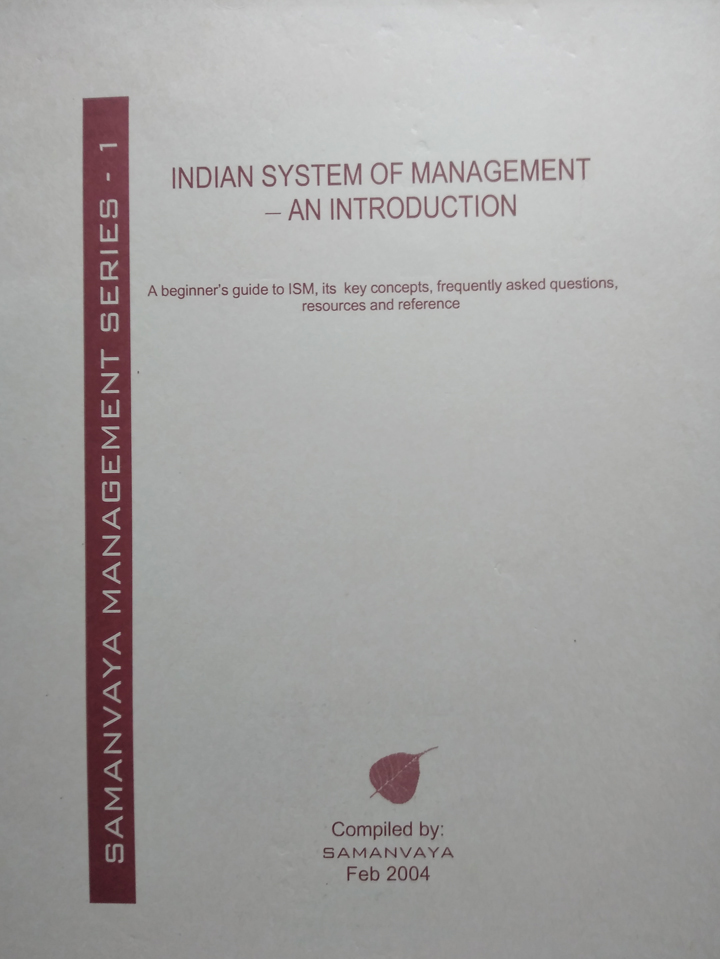
Quintessential Gandhi, 2005:
Pawan Gupta and Anuradha Joshi of SIDH, Mussoorie had visited Germany in early 2000s and as part of their stay and teaching in the Heidelburg University, along with the students they created a beautiful photo exhibition on Gandhi. These photos and captions when they came to India, were further enhanced, and worked by the late Gandhian historian Sri. Dharampal with the help of Samanvaya team and converted into a publication, in the coffee table format. The publication was further reprinted as a low cost edition by New Horizon books and a Tamil translation of the book done by late Sri. M. R. Rajagopal, former Secretary of Gandhigram Trust, was published under the title Idhu Gandhi by Kizhakku Padhippagam in Tamil.
Out of Print
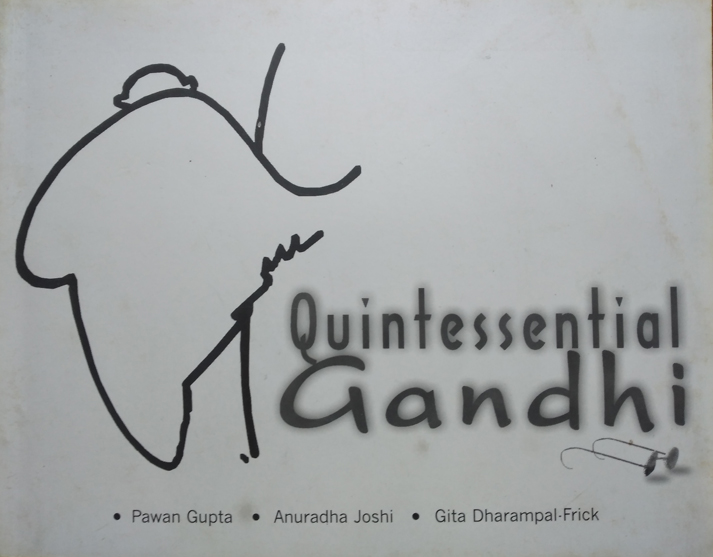
Let’s Talk Swaraj, 2007:
Since 2001 Samanvaya has been organizing an annual dialogue on the small book called Hind Swaraj by Gandhiji. Many Gandhian scholars concur that it is his most defining publication and it is rated as one of the most complete critic on modernity by scholars from the West and East alike. In 2004 a two-month long programme was organized with several scholars from across political spectrum participating. The next year Samanvaya also organized a camp in Gandhigram in which social activists and leaders participated. These dialogues were compiled and brought together by Priya of Samanvaya as a publication. It is rated as a companion edition for Hind Swaraj by several people and as a easy to use guide of the otherwise complex work by Gandhiji.
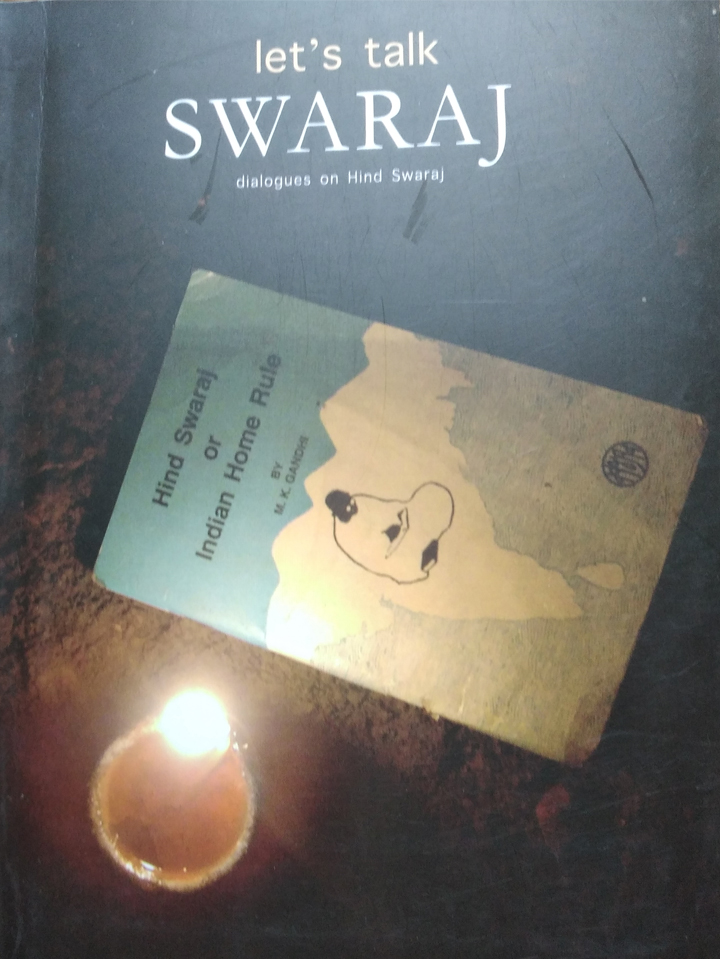
Baingan Swaraj, 2012:
As part of promoting organic farming and environmental friendly farm practices, Samanvaya team had realized the dangers of the introduction of the Genetically Modified seeds. Members of the organization have been active part of creating awareness on this issue and create an informed debate among the public on not just this issue, but, also technology governance overall. As part of the dialogue building process, the small awareness booklet Baingan Swaraj was written by Chief Samanvaya on the dialogues around the introduction of genetically modified Bt Brinjal.
Currently Out of Print however you can register to access a soft copy here
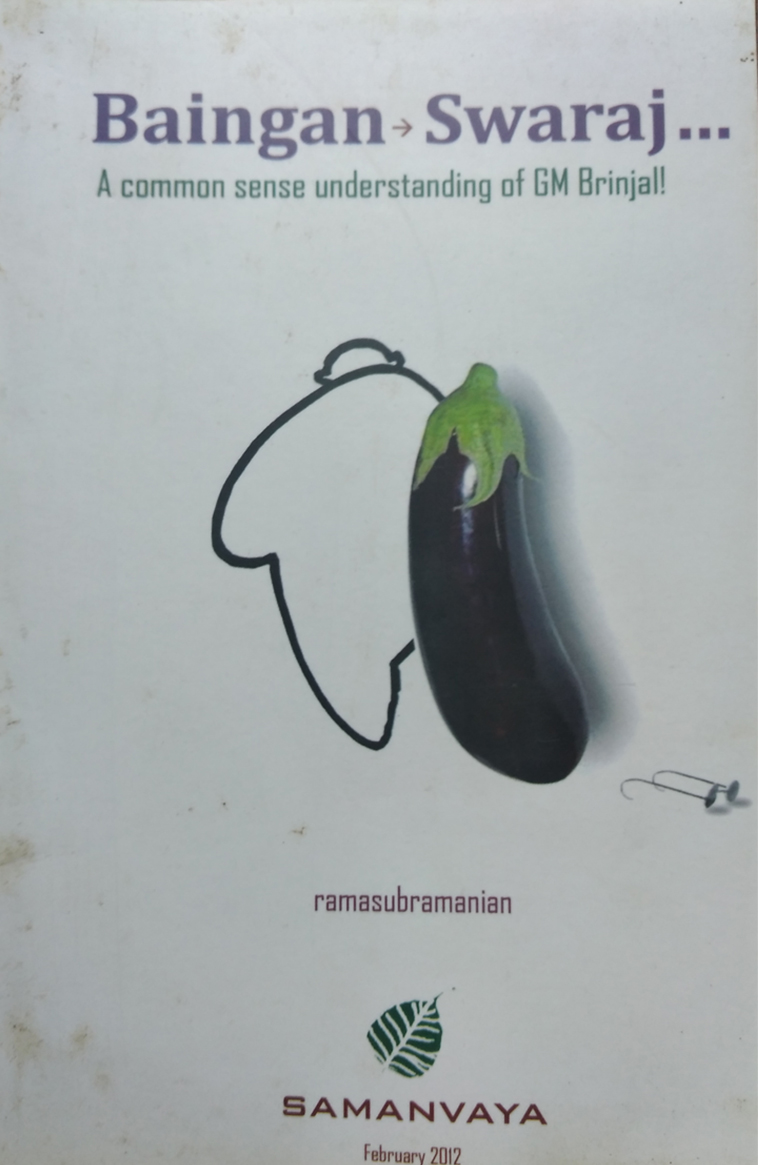
Dharma Unplugged, 2018:
Dharma, is an ancient Indian word that means ethical social engagement. Long before people got aggregated in the name of faith, markets or nation states, smaller local communities in this country had adopted ethical code of conduct in their daily life, many of these were under the broad title of Dharma. In the encounters with ordinary communities and how they manage their affairs, we have often encountered a deep seated understanding and adherence to ethics which they do not articulate. It was decided to compile these as small stories about ordinary people who have ethics not dictated by any scripture or head of religion, but, on their own. The small booklet on Dharma was put together for release during the Parliament of World Religions in Toronto, 2018 in which the Director of Samanvaya participated. It was released by Swami Tyagananda, head of the Boston Ashram of Ramakrishna Mission & Math. Among the recipients of the first copies were Mr. Gray Cox, a Quaker Elder in Maine region of USA, the head pontiff of the Mudibidri Jain order from northern Karnataka and late Swami Agnivesh of the Arya Samaj.
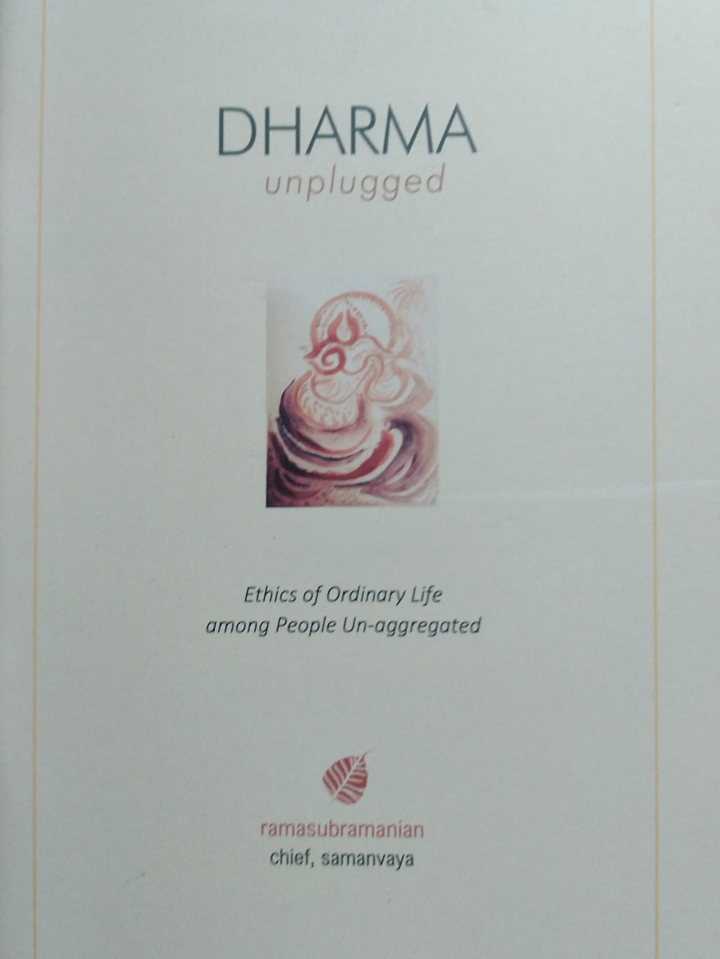
You can write to us at knowledge@samanvaya.com for getting copies of those publication if you are based in India. The cost of the publication and postage will be charged.